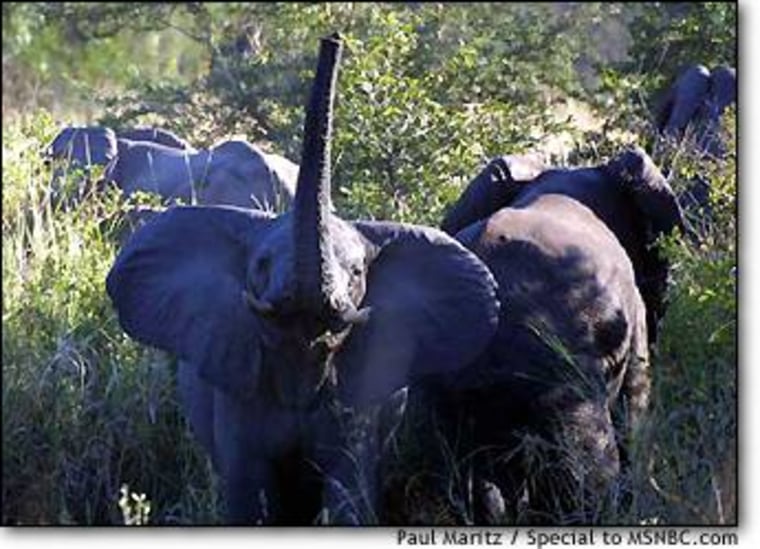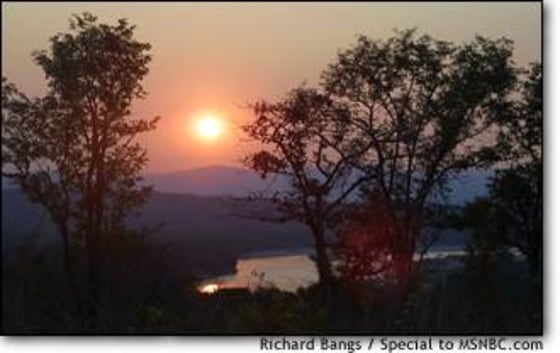If there is a common element to adventure in Africa, it is the excitement that comes from facing the maw. At the moment of capsize on the Zambezi, or the dodge of a rock fall on Kilimanjaro, or facing the feral eyes of a large and lethal beast, we are feverish but also unlocked in a way that never happens in the comfort zone of our daily lives.
IT IS THE LAST night of our exploration of remote Zambia, the little-visited heart of Africa, and we have saved the wildest place for last, Mandevu Park, a 50,000-acre private game reserve on the lower Luangwa River that has yet to appear on any map.
We ate Mexican food, probably the only tacos and hot sauce in a 500-mile radius, and were sipping G&Ts around a mopani wood fire (a hot-blazing hardwood that “burns as long as your passion”) as the gibbous moon began its bright sweep across the southern sky. Much of the conversation is about how to deal with African wildlife. Unlike Kenya, Tanzania, South Africa and other popular wildlife viewing destinations, Zambia allows “walking safaris” (the concept was invented here by the late elephant control officer, Norman Carr).
STEP ONE: DON’T RUN
Earlier in the day we had taken a hike, probably the first westerners to do so, up to the top of Mount Shongon, which means “the place no one goes” in Nyanja, the local language. Along the way we trekked along the footpaths of an array of herbivores and predators. So, the fireside talk concerned what to do when surprising a beast while wading through high grass or the tangle of thorn trees.
Professor Justin Seymour-Smith, lifetime owner of a private game reserve in Zimbabwe, is our guide, and authority on wildlife behavior, and he counsels across the flames: “You never know what a wild animal will do. Meeting you without warning on its turf it might turn and go away, or it might charge. There are no shortages of tales in Africa of folks who have been on the wrong side of animal whim. But there are some general rules. If you encounter a big cat, never run….stare it down, and slowly back up, otherwise it will chase you like a house cat to a mouse; if you chance upon a gorilla, crouch down, and bow your head as though praying; if you bump into a hippo or croc or poisonous snake, run like a rat… you don’t have to run faster than the animal; just faster than your companions.”
UNDER THE AFRICAN MOON
Exhausted from our aggressive wanderings that had taken us from the secluded Busanga Plains in the west to this hidden preserve on the Mozambique border, I announce an early retirement. My little North Face Lunarship tent is pitched on the high mud banks of the Luangwa River. The others are staying in “chalets”, grass-roofed huts with beds, showers and flush toilets, but because I am a world-class snorer, I courteously offered to pitch a tent 100 yards from the rest. Besides, I like looking up through the mosquito netting to the Southern Cross.
InsertArt(1982162)For some reason, I’m restless and I roll about in my bag. I feel the cold air from the canyon downstream creep in. I hear the sighing of the river, the whirr and chirp of crickets, and later, the voice of an owl, like a dark brushstroke on the night.
Then about 10:00 pm I hear some rustlings up river. I sit up. The light on the winding river is luminous as a pale shell and the lineaments of the upstream trees seem to sway. Hippos, I think. Hippos graze at night, eating as much as 200 pounds of grass a setting, but they enter and leave the river at well-trampled paths, and my little tent is pitched a prudent distance from any such corridor. So, I roll over and again attempt to force sleep. But the crackling continues, and is getting closer, or so I imagine. But after a time the sound abates. Something doesn’t seem right.
I sit up again and peer through the mosquito netting. The ridges of the hills are crowned moonlight, melting into the shadowy ravines. Everything — hills, woods, ancient rocks — hang in chasms of blue air; the whole valley is veiled in liquid light. It seems I am looking at the ghost of a world.
CALLING DAVID ATTENBOROUGH
I squint and scan the horizon. At first I detect just a grey blur against the dark foliage upstream. It might be a tree. But it moves. It disappears and reappears again further down the bank. At last it lumbers out of the surrounding tangle of shrub and creeper and emerges at the edge of the river bank. It is no longer just a blur but has shape and form, an elephant form (Loxodonta Africana) a thunderhead of flesh and huge rolling bones with long white tusks flashing in the moonlight. Slowly, almost imperceptibly, it crosses the bank, with pauses now and then to fan out its ears.
The jumbo treads closer and closer; my heart begins to pound. Never have I seen a beast so big so close. If life is measured not by the number of breaths taken, but by the moments that take breath away, I am extending my life by a load.
About five feet from the entrance to my tent he halts, and stares inside. I remain as motionless as I can, and look back into eyes like clear brown water, eyes that telegraph a look of wildness no civilization could endure. Then a cramp in my leg develops, so I try to reposition it without making a sound, but I rub against the sleeping pad which makes a squeak.

The elephant stretches his trunk towards me, and I can see the symmetric ridges decanting, like poured geometry. He sniffs, then steps back a foot, and flaps his ears, the way elephants do when angry or about to charge, or so I think I recall from documentaries and picture books. Is he about to charge? Should I try to unzip the tent and run? Should I clap my hands like a rifle shot and see if he will run? Should I shine my flashlight in his eyes? Should I lie down and play dead? I have my Iridium sat phone in my fanny pack…I wish I could call David Attenborough. But I have no numbers to call, and am certain the elephant would hear my voice if I did. So I just freeze in a sitting position and watch as the elephant circles my tent to the other side and begins to make long siphonings on the sausage tree that spreads above me.
Whew…I relax a bit. He is ignoring me. But then I hear what seems like a sawing sound upstream. I look and see a huge acacia swaying in the moonlight, like the treetops in “Jurassic Park” before a sauropod appears. Another elephant is rubbing his back against the tree on the camp perimeter. Then it steps from a palisade of thorns onto the camp grounds following the footsteps of its predecessor, along the rim of the river towards my tent.
NOTE TO SELF: SKIP THE TACOS
This elephant is bigger than the last, the glint of his tusks brighter. With smooth, rhythmic strides he moves to the very edge of my tent, and he too stops and glares inside. His great fanned ears move slowly to and fro. His breath pours through the netting and presses down on my shoulders. As he alters his position in the moonlight the shadows show the structure of his great body, immensely heavy, slung from mighty backbones, supported by columnar legs. I can’t help but think he looks like a baobab come to life.
Now there is one bull chomping on the tree next to me, and another starring me down. And my stomach starts to growl. The Mexican meal is starting to process, and I can’t hold back a sound. It pipes from my tent, and both elephants turn to glower and flap their giant ears. My god, I think, I am about to be stomped to death. Genuinely frightened, I feel my heart fly around my insides; my mouth goes dry and my limbs shudder.
I think about rolling the tent down the bank into the river, but then remember I had tethered it to the sausage tree so as not to blow away. And besides, the river is filled with crocs and hippos. The tether rope makes me quiver: The first elephant is a yard away; if he moves forward and trips on the tether he will fall on my tent, crushing me. I consider again making a run for it, but then remember how much noise the zipper makes, and know it will cause even more alarm.
Then I hear a sound like Niagara by the tree. My bladder is full as well, and is beginning to bay….too many G&Ts. I am terribly tired. But I dare not close my eyes. The thought of being trampled with eyes open wide is bad enough. But I know if I fall asleep I will snore, and I can think of nothing worse than to be squashed while snoozing. So, there I sit, stiff as a log, as the elephants scoff and sniff and chivvy about me.
Elephants can eat for 20 hours a day. A long night this might be. But then after a couple of hours of munching, the two leviathans lie down in a sandy spot below my tent, and go quiet. I take advantage of the respite, and also lie down, but command myself to not fall asleep. But my eyelids grow heavy.
I hear some crunching, sit up and look through the mesh. Did I nod off? The moon has crossed the sky and sunk behind the trees. I can barely make out a silhouette shambling back upstream. With an unhurried pace it moves back into the shelter of the trees, entwines itself within branches and leaves, and then it is gone.
SWEET RELIEF
There is no other sound, save the litany bird, whose call seems to cry, “Good Lord, deliver us.” There are no more hulking specters. So I presume both are gone, at last. But a silent presence still hangs in the air. I am about to burst, so I unzip the tent, and leap outside to relieve myself.
Just as I finish, a basso profundo bellow rips open the night just a few yards from me. I had stirred the other beast. I dive back into the tent, re-zip it, and jump into my bag. There is a subtle spark to his slow-moving pace as he clambers up the bank and fixes me with a wall-eyed stare. Our eyes lock, and for a second I think I see a hint of empathy for a small, vulnerable creature wrapped in nylon. Then the elephant turns and quietly plods back into the bush. I fall into a deep sleep, returning with the dawn to the illusion of a more managed, if less exhilarating, place. Richard Bangs was recently editor-at-large for Expedia.com, is co-founder of Mountain Travel-Sobek, and is author of 13 books. His latest is “Adventure Without End.”
